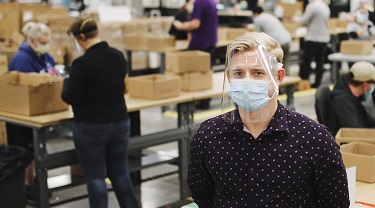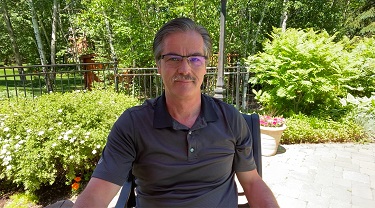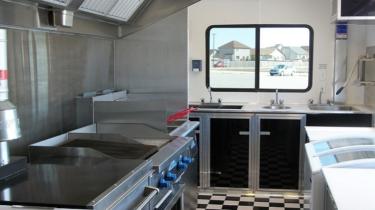When COVID-19 first hit Canada, Jeremy Hedges’ company, InkSmith, wasn’t immediately impacted. But he could never have imagined the sharp learning curve he’d soon face as a result of the global pandemic.
Based in Kitchener, ON, InkSmith specializes in educational technology to help teachers in classrooms across Canada. Their teaching-unit-in-a-box kits introduce robotics, design and engineering to students and encourage them to come up with inventions that could solve real-life problems. Before COVID-19, the company was already in contact with Export Development Canada (EDC) about taking their products to international markets while reducing the financial risks associated with going global.
Then the coronavirus hit and everything changed. While the outbreak was unsettling and even devastating for many Canadian entrepreneurs, it would bring an incredible opportunity for 27-year-old Hedges, who saw both his parents run their own businesses when he was growing up.
His new business started with a knock on his door. Literally.
A local doctor showed up at the InkSmith offices to see if they would consider putting their 3D printers to an entirely different use. The doctor had heard of an Italian company that printed ventilator valves for a hospital when their supplier ran out. The next day, another doctor stopped by to ask if InkSmith could help solve the region’s shortage of 10,000 face shields for health care workers by making the protective gear. Hedges was in.
Initially, the company wasn’t trying to corner the market in face shields—they just wanted to help out. It quickly became clear that 3D printing single-use face masks was too slow to be an effective solution to massive demand. That’s when they put out the call to on social media to crowd-source printed parts from people who have their own 3D printers and want to help fight COVID-19.
“The response was incredible—we were getting parts from all over, but it was still too slow to meet demand,” says Hedges. Instead of abandoning the project, however, InkSmith partnered with Kwartzlab, a non-profit “maker society” that has since been managing the crowdsourcing project, which is still producing the 3D-printed Community Shield.
For InkSmith, it was time to come up with something completely new. The team wanted to create a face shield design that could be made quickly and cleaned easily so it could be used more than once. “We went from working with 3D printers to laser-cutting a design. And we kept adding to our tech stack to make it more efficient,” says Hedges.

Fast-forward a few weeks and their new product—affectionately dubbed The Canadian Shield—was approved by Health Canada. InkSmith also has a contract from the federal government to produce 10 million face shields in three months. That order bumped up staff numbers from less than 10 people to about 250. It also put them in a new 50,000-square-foot facility.
Hedges attributes some of his company’s ability to get into the health care field to luck. “I’ve got lots of friends that had to shutter their doors, lay people off. It’s a tough time to be in business,” he says. He also learned a lot from his decision to pivot his business. Here’s some of the lessons he wants to share:
Prepare for a huge amount of upfront work.
Coming up with a new product and a safer way of working takes a lot of time and commitment. The first couple of weeks were jammed but “magical,” Hedges says. His team came up with endless prototypes for shields, trying to design a better product that could be used more than once. But they didn’t have a lot of time to sit and think. Every day brought early mornings and late nights. Weeks later, he still has long days, arriving at work at 7 a.m. and leaving at 11 p.m. Seven days a week.
Talk to experts in the field and look for gaps.
If business owners are trying to fill a new niche, or just do things differently, Hedges recommends they talk to experts as they develop their new product. Everyone knows that businesses are failing right now and people genuinely want to help others get through these challenging times. People are ready and motivated to share advice and experience. They’ll help you zone in on what the needs are for your product or service and they can talk to you about what they see as gaps in the market that you may not have noticed. In InkSmith’s case, they saw an opportunity to create a face shield that could be reused—many in the market can’t be because of a large piece of foam that cushions the wearer’s forehead.
Get hands-on trials and feedback.
InkSmith was in contact with dozens of health care professionals and constantly sending face shield prototypes back and forth to frontline workers for their evaluation and suggested modifications. At one point, the CEO of a local hospital was acting as a courier between the InkSmith offices and his hospital to speed up the feedback process. Of course, not everyone will have that kind of buy-in, but Hedges says you really can’t show your product to enough people. He had dozens of people from many different health care facilities giving feedback.
All hands on deck.
Hedges often spends an eight-hour shift on the shop floor helping make the face shields, then goes back to his office to send emails and look at finances and staffing. Working on the floor helps him better understand the process and flow of his new business. It helps him envision how he might want to improve things, while still keeping those improvements realistic. “I get a ton of motivation from talking to my staff,” he says. “People have been through so much.”
You should also check out
Our Export Guarantee Program (EGP) can help your bank provide you with additional financing.
Talk to your financial institution.
As mentioned above, Hedges was already talking to EDC about taking his educational tech business international when COVID-19 knocked the planet for a loop. “I was really happy with how RBC and EDC worked together to come up with a solution that met my business needs so quickly,” says Hedges. RBC and EDC were able to help InkSmith scale up fast with a bank loan that had EDC’s Export Guarantee Program added on to act as a guarantee. Because of the pandemic and the fact InkSmith was making protective health care gear (which many financial institutions are prioritizing for consideration), a loan that should have taken a month to get approved went through in a week.
Take workplace health precautions very seriously.
InkSmith put a lot of measures in place to make sure their staff stays healthy. The worst thing, Hedges says, would be to finally open and then get shut down because they did something wrong. He’s seen it happen.
He knew it was essential to consult the local public health unit and the Ministry of Health on how he should be opening the shop and whether what he’s put in place is enough. He also had a doctor come in to see if what they had done was adequate.
Here’s what works for them: Everyone wears a surgical mask and eye protection. Most wear one of the company’s own face shields. They’ve put tape all over the floor to identify six-foot (two-metre) spacing. “While tape might seem a bit of overkill or unnecessary, you’d be surprised how hard it is to judge appropriate physical distancing when you’re busy doing other things or talking to a colleague,” Hedges says.
When you enter the InkSmith building, they have hand sanitizer and temperature scanning. They keep logs on the temperature of every employee. They only use their kitchen one at a time and everyone who goes in the kitchen has to wash and sanitize their hands first. They’ve set up lunch stations that are six feet apart. People are expected to spray them down and clean them before and after they eat. They also have a cleaning service that operates around the clock, because the manufacturing keeps going overnight. The goal, Hedges says, is to have every door handle and hard service disinfected every hour. So far, it seems to have worked. No one’s gotten sick.
Plan long term.
Does Hedges think Canada’s health care system will always need a massive supply of face shields? No—at least he hopes not. He guesses things will likely change again in a year or two, so he’s trying to picture what the future might look like for his new business and manufacturing in general. They’re already talking about investing in a variety of other technologies, so they can make a full suite of personal protective equipment (PPE), including surgical masks, gowns and more. “There’s opportunity for growth because I want to turn this crazy time into an opportunity that lasts—for my business and for the people in my community,” says Hedges.





